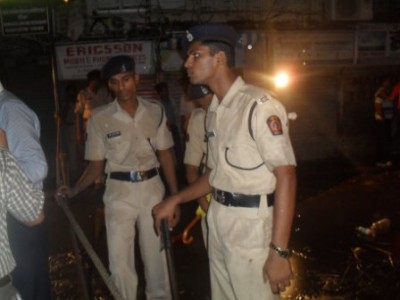NEW DELHI, July 14 (Xinhua) — With the 2008 deadly Mumbai terror attack still fresh in mind, the Indian financial hub was again targeted by three terror blasts on Wednesday evening, which killed at least 21 people, making it the fifth major attacks in the last two decades.
The Indian media and local residents are asking why the city has been targeted again and again.
Prithviraj Chavan, Chief Minister of Indian state of Maharashtra, with Mumbai as its capital, told local news channels that terror attacks repeatedly happened in Mumbai because it is the financial hub of India.
“Mumbai and Delhi will always remain terror targets. Delhi is the political capital and Mumbai the financial one. An attack on a city like Mumbai always rocks the nation and gets the attention of the world, which is what terrorist groups want,” Chhagan Bhujibal, who was home minister of the state, told Hindustan Times.
He added “the population density is such that a terror attack in Mumbai causes more casualties and unfortunately creates the desired impact for the terrorist groups.”
So far no one has claimed responsibility for the blasts, but the home-grown terror outfit Indian Mujahideen (IM) are currently the prime suspect of the police.
Wednesday’s blasts came a day after the Maharashtra Anti- Terrorism Squad (ATS) announced the arrest of two Indian Mujahideen terrorists who were involved in the 2008 serial blasts in the Indian state of Gujarat that killed 56 people.
The triple bombings at crowded places in Mumbai, which has turned out to be a soft target for terrorists, bear a “signature” of what the IM had used in carrying out earlier blasts in Bangalore, Ahmedabad and New Delhi in 2008, Varanasi and Pune in 2010, intelligence sources told Indo-Asian News Service.
However, they said it was just a “preliminary observation” as a detailed inquiry by a joint team of premier terror probe agency National Investigation Agency and the ATS would reveal who was behind the blasts.
Others are suspecting that the terror attacks which occurred barely a fortnight before the meeting of foreign ministers of India and Pakistan here might relate to some right-wing elements which are trying to derail the revived peace process.
India has avoided pointing finger at Pakistan for the serial blasts. After suspending peace talks with Pakistan for over two years following the 2008 Mumbai terror attack, which was allegedly carried out by Pakistani based terrorist groups, India decided to revive the peace process with its neighbor in February this year.
Both Pakistani President Asif Ali Zardari and Prime Minister Yousuf Raza Gilani were also quick to condemn the Mumbai attacks.
The blasts also took place a few days before U.S. Secretary of State Hillary Clinton comes to India for the second India-US strategic dialogue on July 19-20.
According to a report by Stratfor Global Intelligence, a U.S. strategic affairs think tank, though the magnitude of these explosions has yet to be determined, this attack does not appear to be as sophisticated as the 2008 attacks and the tactic appears much more in line with those used by more amateurish groups, such as the Indian Mujahideen, who have targeted crowded urban areas before.
However, the think tank placed the attacks against the backdrop of the fragile security dynamics in the Afghanistan-Pakistan region. A crisis between India and Pakistan would complicate the U. S.-Pakistani dealings on Afghanistan, potentially serving the interests of al-Qaida as well as factions within Pakistan trying to derail a negotiation between the United States and Pakistan.
The Indian Mujahideen is believed to be a shadow organization of the banned Students Islamic Movement of India (SIMI) and the Pakistan-based Lashkar-e-Taiba.
Despite speculations on the attackers, the serial blasts once again put India’s capabilities of counter-terrorism in question.
India has put massive investment in counter-terrorism intelligence capabilities after the 2008 Mumbai attack. More news of terrorists being arrested come out during P. Chidambaram’s tenure as Home Minister.
Just one week ago he said “with a sense of satisfaction” the 2011 had witnessed “the lowest level of violence in over a decade. “
However, in spite of massive investments in investigation and counter-terrorism intelligence capabilities since the 2008 Mumbai attack, police forces across the country have made little progress in identifying the perpetrators of the five major urban attacks which have taken place since then, commented local English daily the Hindu.
The attacks include the February 2010 bombing of the German Bakery in Pune, the April 2010 serial bombings at the Chinnaswamy stadium in Bangalore, the drive-by shooting at Delhi’s iconic Jama Masjid in September 2010, and the December 2010 bombing at the Shitla Ghat in Varanasi.
Investigators believe all the five attacks are linked to members of the Indian Mujahideen, but little hard evidence, however, has emerged to support the claim.
“Even though both state and central governments have been scrambling to set up all kinds of special counter-terrorism forces, ” says Ajai Sahni, Director of the Institute for Conflict Management in New Delhi, “there has been no real effort to improve intelligence-gathering and investigations capabilities from the bottom-up.”























